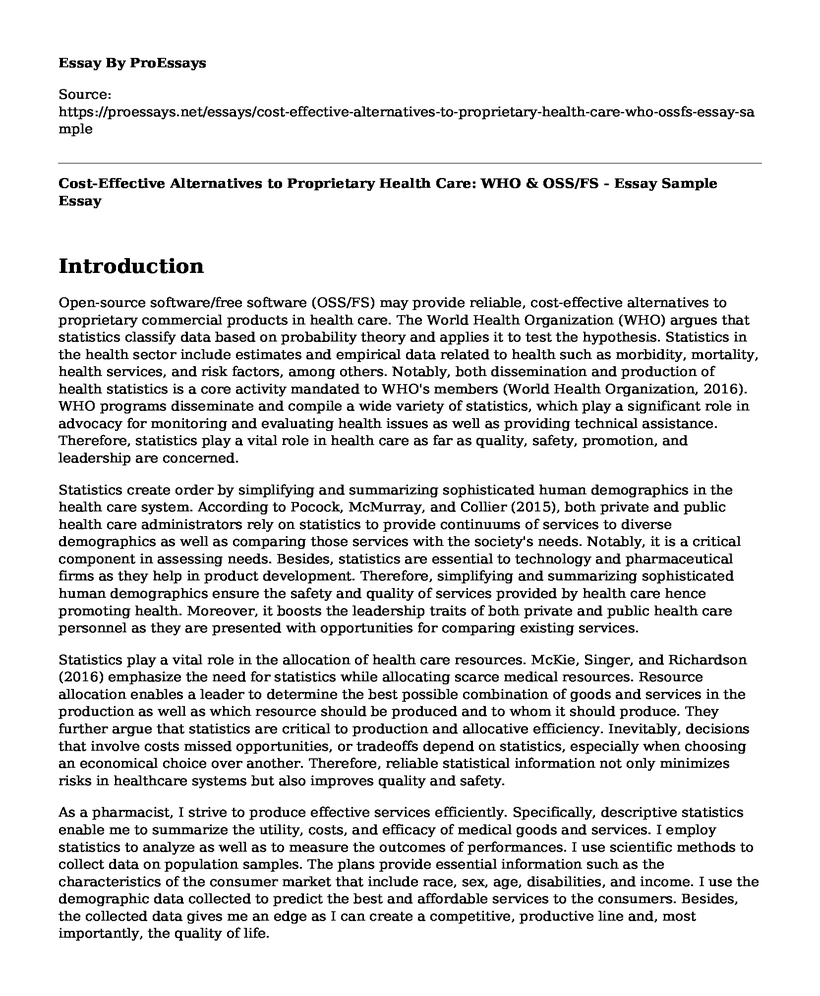Introduction
Open-source software/free software (OSS/FS) may provide reliable, cost-effective alternatives to proprietary commercial products in health care. The World Health Organization (WHO) argues that statistics classify data based on probability theory and applies it to test the hypothesis. Statistics in the health sector include estimates and empirical data related to health such as morbidity, mortality, health services, and risk factors, among others. Notably, both dissemination and production of health statistics is a core activity mandated to WHO's members (World Health Organization, 2016). WHO programs disseminate and compile a wide variety of statistics, which play a significant role in advocacy for monitoring and evaluating health issues as well as providing technical assistance. Therefore, statistics play a vital role in health care as far as quality, safety, promotion, and leadership are concerned.
Statistics create order by simplifying and summarizing sophisticated human demographics in the health care system. According to Pocock, McMurray, and Collier (2015), both private and public health care administrators rely on statistics to provide continuums of services to diverse demographics as well as comparing those services with the society's needs. Notably, it is a critical component in assessing needs. Besides, statistics are essential to technology and pharmaceutical firms as they help in product development. Therefore, simplifying and summarizing sophisticated human demographics ensure the safety and quality of services provided by health care hence promoting health. Moreover, it boosts the leadership traits of both private and public health care personnel as they are presented with opportunities for comparing existing services.
Statistics play a vital role in the allocation of health care resources. McKie, Singer, and Richardson (2016) emphasize the need for statistics while allocating scarce medical resources. Resource allocation enables a leader to determine the best possible combination of goods and services in the production as well as which resource should be produced and to whom it should produce. They further argue that statistics are critical to production and allocative efficiency. Inevitably, decisions that involve costs missed opportunities, or tradeoffs depend on statistics, especially when choosing an economical choice over another. Therefore, reliable statistical information not only minimizes risks in healthcare systems but also improves quality and safety.
As a pharmacist, I strive to produce effective services efficiently. Specifically, descriptive statistics enable me to summarize the utility, costs, and efficacy of medical goods and services. I employ statistics to analyze as well as to measure the outcomes of performances. I use scientific methods to collect data on population samples. The plans provide essential information such as the characteristics of the consumer market that include race, sex, age, disabilities, and income. I use the demographic data collected to predict the best and affordable services to the consumers. Besides, the collected data gives me an edge as I can create a competitive, productive line and, most importantly, the quality of life.
Conclusion
In conclusion, the health industry has, in recent years, moved from volume reimbursement to value. The shift, primarily determined by statistics, has seen the emergence of lower costs, higher quality, and improved patient experience. The world has progressed through data management. Statistics have played significant roles in health care, especially on the quality and safety of services provided. The promise of statistics in health care systems lies in its ability to shift into a data-driven culture.
References
McKie, J., Singer, P., & Richardson, J. (2016).The allocation of health care resources: An ethical evaluation of the QALY approach.Routledge.
Pocock, S. J., McMurray, J. J., & Collier, T. J. (2015).Making sense of statistics in clinical trial reports part 1 of a 4-part series on statistics for clinical trials. Journal of the American College of Cardiology, 66(22), 2536-2549.
World Health Organization. (2016). World health statistics 2016: monitoring health for SDGs sustainable development goals. World Health Organization.
Cite this page
Cost-Effective Alternatives to Proprietary Health Care: WHO & OSS/FS - Essay Sample. (2023, Mar 14). Retrieved from https://proessays.net/essays/cost-effective-alternatives-to-proprietary-health-care-who-ossfs-essay-sample
If you are the original author of this essay and no longer wish to have it published on the ProEssays website, please click below to request its removal:
- Essay Sample on the Effects of Bariatric Surgery in HIV Patients
- Paper Example on Patient Neglected: Missed Critical Testosterone Doses
- School Nurse and Student Development: A Vital Connection - Essay Sample
- Pros and Cons of Medical Marijuana Annotated Bibliography
- Essay Sample on Legalize Abortion: Supporting Women's Right to Choose
- Annotated Bibliography Example on Marital Stress Worsens Prognosis in Women with CHD
- Paper Example on The Pfizer Works Program







